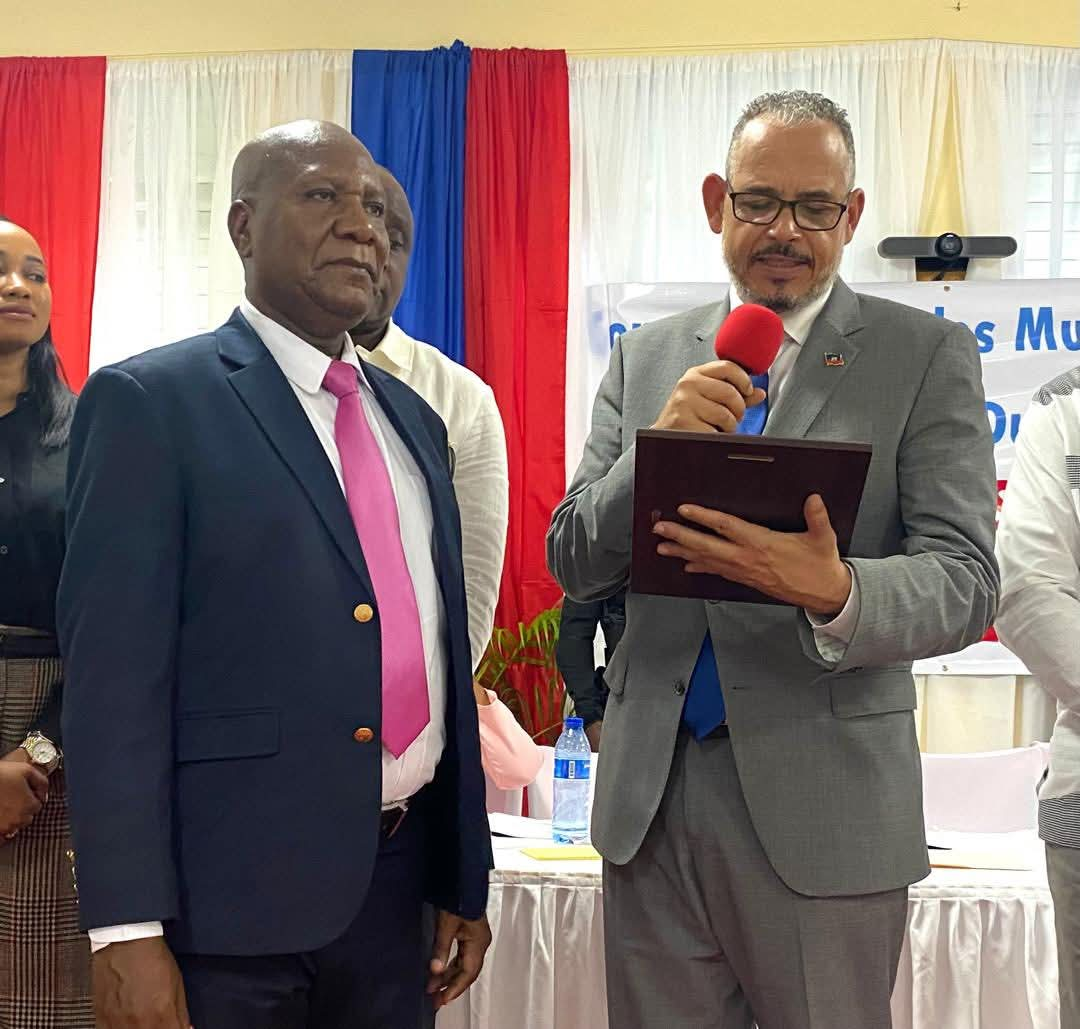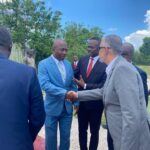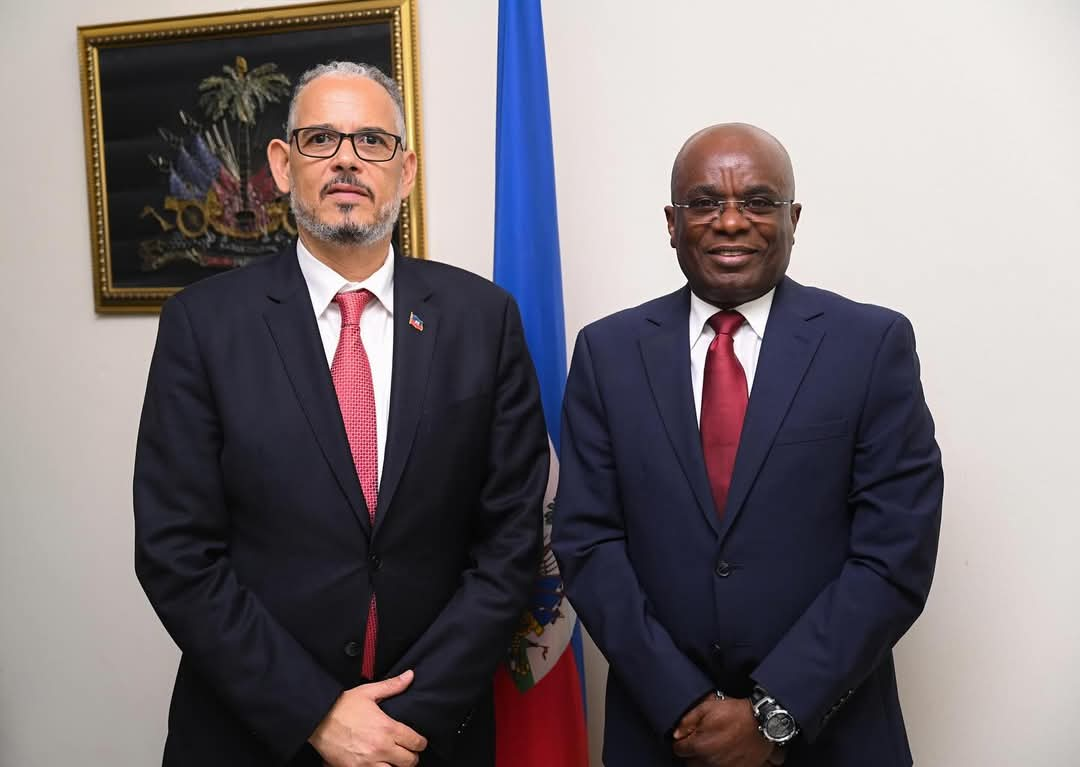During a strategic meeting held in Les Cayes, Prime Minister Alix Didier Fils-Aimé rallied business leaders from the southern departments of Haiti in an effort to build consensus ahead of the upcoming constitutional referendum and national elections. The session brought together representatives from the Chambers of Commerce across the Grand Sud region, addressing key issues including regional insecurity, economic recovery, institutional reforms, and democratic renewal.
This visit, part of a broader national dialogue tour, is the latest effort by the Haitian government to strengthen ties with regional stakeholders and align national priorities with local needs. At the heart of the conversation was a clear message: development, security, and democracy must move forward together — or not at all.
“Economic growth and democratic stability are inseparable. You can’t have long-term development without legitimate institutions, and you can’t have credible elections without trust and security,” declared the Prime Minister during the session.
The meeting, held in a climate of open dialogue, focused on the economic vulnerabilities of the South — fragile infrastructure, the flight of productive labor, and an urgent need for coordinated, inclusive recovery efforts. Fils-Aimé praised the role of the private sector as a cornerstone of economic and social stability and urged business leaders to help shape a roadmap for elections and development.
The Chambers of Commerce voiced concerns over worsening insecurity, stagnant investment, and the growing disconnect between central governance and local realities. They emphasized the need for clear policies to protect enterprises, secure infrastructure, and rebuild confidence.
The Prime Minister acknowledged these concerns and promised that the government would incorporate local recommendations into its national agenda, with a special emphasis on decentralization, regional investment, and transparent electoral processes.
Elections Are Everyone’s Responsibility
Switching to Haitian Creole, the Prime Minister made a powerful appeal for collective responsibility in the electoral process:
“Elections aren’t the business of one group or one political faction — they’re the responsibility of the entire nation. Political parties, citizens, institutions — everyone has a role to play,” he said.
He emphasized that the right question isn’t whether elections will happen, but rather what actions each individual and sector will take to make them possible:
“Many people keep asking if elections are even possible. But that’s the wrong question. The real question is: What are we each doing — citizens, leaders, youth, civil servants — to ensure they happen?”
This shift in framing was meant to reignite civic engagement and highlight the urgency of rebuilding democratic norms in a country that has gone nearly a decade without national elections.
Democratic Crisis
The Prime Minister didn’t shy away from confronting the consequences of prolonged electoral absence. In the Grand Sud, local populations have endured ten years without casting a vote — a reality that has fed into institutional decay and public disillusionment.
“Ten years without elections is not just a delay — it’s a crisis for any democracy. If we want to move this country forward, we need to make a collective decision, together. Shoulder to shoulder,” Fils-Aimé urged.
He called on all sectors — public, private, civic, and youth — to unify behind a shared commitment to rebuild the democratic foundation of the Haitian state.
Constitutional Reform
One of the central objectives of the consultation was to prepare for the constitutional referendum. The Prime Minister insisted that a new Constitution is essential for genuine reform and national progress:
“This decision must be bold enough to give Haiti a new Constitution, unlock serious reforms, and allow the youth of this country to chase their dreams.”
According to Fils-Aimé, the current system has failed to respond to the needs of the people — especially young people. He sees the referendum as the first step in building a state that serves all Haitians, not just a privileged few.
Security as a Prerequisite for Democracy
Echoing the concerns of the business community, many representatives pointed to rampant insecurity as the main barrier to any form of democratic or economic progress. They called for stronger protections, clearer rules, and urgent action from national authorities.
Fils-Aimé did not deny the severity of the challenge but stressed that the government is already taking steps:
“We can’t talk about serious elections if people don’t feel safe. We can’t ask the private sector to invest or take risks unless we give them the basic conditions to operate. That’s the government’s job — to provide security and clear rules.”
He confirmed that the High Council for National Security is mobilized and that targeted measures would be taken in key regions to restore order and prepare the ground for elections.
Toward a National Roadmap
This meeting in Les Cayes is part of a larger series of regional consultations. The Prime Minister plans to extend this outreach to the North, Artibonite, the Central Plateau, and the metropolitan area of Port-au-Prince. His goal: to build a nationally-owned electoral process and a truly inclusive reform agenda.
He ended the session with a message of shared ownership:
“We don’t need change that stays on paper. We need every Haitian, wherever they are, to feel included in this process. The government alone can’t fix this — but we can lead by example.”
The Prime Minister’s visit to the Grand Sud marks more than a symbolic gesture; it signals a clear political strategy to ground the national recovery in local engagement and shared responsibility. In a country fractured by violence, corruption, and despair, this initiative seeks to spark a new kind of partnership between state and society.
Whether these promises will turn into results remains to be seen. But for now, the people of Southern Haiti have been given a seat at the table — and their voice, often sidelined, has become a part of the national conversation.





